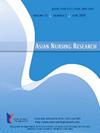Turkish Validity and Reliability Study of the Sustainability Attitudes in Nursing Survey 2
IF 2.1
3区 医学
Q2 NURSING
引用次数: 0
Abstract
Purpose
It is important to examine the attitudes of future nurses toward adopting a sustainability approach in their nursing practice. This study aimed to test the Sustainability Attitudes in Nursing Survey 2 psychometrically.
Methods
The methodological, descriptive study was conducted in November 2019 on nursing students (n = 286) at a university in Türkiye. Data were analyzed for reliability and validity tests. Statistics of the linguistic content validity analysis and exploratory/confirmatory factor analysis were performed to determine the scale's validity. Cronbach Alpha coefficient, floor and ceiling impacts, Tukey's test, and Hotelling's T2 test, test-retest reliability were determined for the scale's reliability.
Results
The content validity index of the scale, which consists of five items and one dimension, is .98. Factor loadings were above .30, all the fit indices were >.95, χ2/df was 1.58, and the root means square error of approximation was .045. Cronbach's α was .75. The floor and ceiling impacts were 0.0% and 3.1%. In Tukey's test, F was 3.43 and p was .064. In Hotelling's T2 test, Hotelling's T2 was 265.59 and F was 65.68 (p < .001). Item-total correlation coefficients were between .37 and .63. The test-retest correlation coefficient was .39.
Conclusion
The scale is a valid and reliable instrument in the Turkish language. It is advised to use the scale in determining attitudes towards sustainability among nursing students, evaluating the effectiveness of training, and taking student opinions in curriculum revisions. Also, the study allowed cross-country comparisons, and it is thought that it can guide studies on the inclusion of sustainability principles in nursing practices.
土耳其护理人员可持续性态度调查的有效性和可靠性研究 2.
目的:研究未来护士在护理实践中采用可持续性方法的态度非常重要。本研究旨在对《护理工作中的可持续性态度调查 2》进行心理测试:本研究于 2019 年 11 月对土耳其一所大学的护理专业学生(n = 286)进行了方法学描述性研究。对数据进行了信度和效度测试分析。为确定量表的有效性,进行了语言内容效度分析统计和探索性/确认性因子分析。对量表的信度进行了 Cronbach Alpha 系数、下限和上限影响、Tukey's 检验和 Hotelling's T2 检验、重测信度的测定:该量表由五个项目和一个维度组成,其内容效度指数为 0.98。因子载荷大于 0.30,所有拟合指数均大于 0.95,χ2/df 为 1.58,均方根近似误差为 0.045。Cronbach's α 为 0.75。最低和最高影响分别为 0.0% 和 3.1%。在 Tukey 检验中,F 为 3.43,P 为 0.064。在 Hotelling's T2 检验中,Hotelling's T2 为 265.59,F 为 65.68(p < .001)。项目-总相关系数在 0.37- 0.63 之间。测试-重复相关系数为 0.39:该量表是一种有效、可靠的土耳其语工具。建议在确定护理专业学生对可持续发展的态度、评估培训效果以及在课程修订中采纳学生意见时使用该量表。此外,该研究允许进行跨国比较,并认为它可以指导将可持续发展原则纳入护理实践的研究。
本文章由计算机程序翻译,如有差异,请以英文原文为准。
求助全文
约1分钟内获得全文
求助全文
来源期刊

Asian Nursing Research
NURSING-
CiteScore
4.20
自引率
4.50%
发文量
32
审稿时长
45 days
期刊介绍:
Asian Nursing Research is the official peer-reviewed research journal of the Korean Society of Nursing Science, and is devoted to publication of a wide range of research that will contribute to the body of nursing science and inform the practice of nursing, nursing education, administration, and history, on health issues relevant to nursing, and on the testing of research findings in practice.
 求助内容:
求助内容: 应助结果提醒方式:
应助结果提醒方式:


